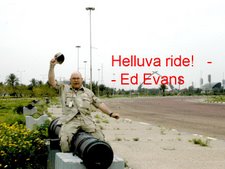by Ed Evans, MGySgt., USMC (Ret.)
Attributed to English statesman and author Edmund Burke is the statement, "There are Three Estates in Parliament; but in the Reporters' Gallery yonder, there sits a Fourth Estate more important far than they all." The Three Estates of which he spoke were the Parliamentary representatives of the church, the nobility, and the common people. Thomas Macaulay, writing much later in an essay, stated, "The gallery in which the reporters sit has become a fourth estate of the realm."
Both of these esteemed men were referring to the power of the press, which was then limited to the printed word. Today the power and influence of the news media has exploded beyond all expectations. In this coming election in America, especially, it is evident they see themselves as "king makers."
However, along with their willing acceptance of the power and influence with which they operate, they have not demonstrated the requisite responsibility, the exercise of wisdom and restraint that should accompany such power among a just people. And now, the American people, whom over a lifetime I have observed are a basically fair people, are beginning to react to what they see as injustice, crass and commercial power-mongering, and bullyism.
Pollster Pat Caddell has stated frankly that today's news media is an enemy of the American people, at http://www.youtube.com/watch?v=IBR4g6cBYeA&feature=player_embedded. CNN gives you a blatant example of what he's talking about:
In a story that few in this country have heard about, the UK Guardian reported that CNN refused to broadcast an award-winning 2011 documentary, “iRevolution.” The documentary featured CNN’s on-air correspondent Amber Lyon and was highly critical of the regime in Bahrain for brutally suppressing peaceful protests by its own citizens.
Why didn’t CNN broadcast its own correspondent’s production? The reason might shock you.
According to the Guardian, “CNNi’s pursuit of and reliance on revenue from Middle East regimes increased significantly after the 2008 financial crisis, which caused the network to suffer significant losses in corporate sponsorships. It thus pursued all-new, journalistically dubious ways to earn revenue from governments around the world. Bahrain has been one of the most aggressive government exploiters of the opportunities presented by CNNi.”
The Guardian story continues, “These arrangements extend far beyond standard sponsorship agreements for advertising of the type most major media outlets feature. CNNi produces those programs in an arrangement it describes as ‘in association with’ the government of a country, and offers regimes the ability to pay for specific programs about their country. These programs are then featured as part of CNNi’s so-called ‘Eye on’ series (‘Eye on Georgia’, ‘Eye on the Philippines’, ‘Eye on Poland’), or ‘Marketplace Middle East’, all of which is designed to tout the positive economic, social and political features of that country.”
To the average viewer unaware of these government sponsorships, CNN’s stories all falsely appear to be the result of standard, unbiased reporting.
Back to the award-winning documentary that CNNi never aired. As noted above, “iRevolution” was critical of the Bahrain government for using violence against its own people. During the time the documentary was considered, Bahrain was highly invested in CNN’s “sponsorship” opportunities. The Bahrain-CNN relationship was so strong, “official agencies of the regime often boasted of how their extensive involvement with CNN was improving the nation’s image around the world.”
Bahrain’s image was apparently improving because Bahrain got what it paid for: “multiple examples of CNN International producing plainly propagandistic coverage of the regime, often without any minimal disclosure of the vested interests of its sources.” And Bahrain wasn’t the only country with the CNN “sponsorship” arrangement.
Essentially, CNN’s approach to government sponsorship of CNN content represents a merger of advertising and news. Frankly, CNN should drop any pretext that such stories are “news” and, instead, clearly label the pieces what they are: government-sponsored advertisements.
This recent revelation appears to be another nail in the coffin of CNN’s loss of public trust.
______________________________________________________
More stories on CNN bias, dishonesty:

No comments:
Post a Comment